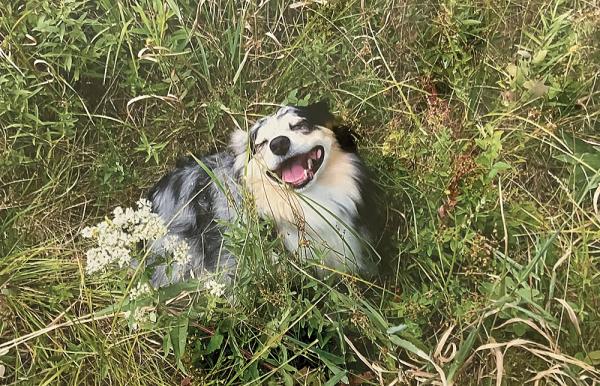December 14, 2023

For thousands of households across Dorchester, there’s a dog or a cat—or perhaps both—that are cherished members of their families. For 14 years, until she died last month, we were blessed with Emma, a mini-Australian Shepherd. She arrived after my son Aleksandr had lobbied for a year for a dog.
We did some research and settled on this breed, finding puppies for sale at a farm in northern Vermont that called itself a ranch instead of a farm, which seemed a bit strange. The owner showed us Emma’s mother, named Cherokee, and when we asked about her father, she said, “Why would you want to see him?”
When we got Emma home, I worked up a fake letter addressed to my son congratulating him on behalf of the Australian Shepherd’s Association for his wise choice. I put the return address of the group on the envelope to make it look real and put it in our mailbox. But the postman got to it first and returned it to the association. A representative soon called in a huff to say we were impersonating the group illegally. And, maybe worse than that, we had spelled Australian wrong.
We loved Emma for 14 years. She was very affectionate and protective. No matter what kind of a day you’d been having, when you came home, you got big happy greeting from her. Unfortunately, breeders of Australian Shepherds crop their tails. We read Emma the book “The Dog Who Lost His Tail,” but that didn’t help. Emma still shook her butt even though she had no tail. My daughter called them “wiggles.”
Emma herded us to the door to take her for a walk. She loved walks in the woods behind Ventura Park, to the secret pathway through the marshes to the Neponset River, and on the sand bar at low tide that enabled you to walk from Squantum in Quincy to Thompson Island.
Emma, to be truthful, barked a lot. She barked at anyone who had the nerve to walk by our house. She barked at people visiting us. We had to distribute dog biscuits to our guests to give to her and they had to sit down right away to stop her barking. But when they got up to leave, the barking started again. On walks with her, it baffled us as to why she barked at some people and some dogs and not others.
We had a “Wag more, bark less” bumper sticker on our fridge, but Emma apparently was not a good reader. But she was good on voice intonation. When we came home to her warm greeting only to see the kitchen trash barrel tipped over, we’d address her with disapproval. She’d then slink guiltily under the table – for perhaps two minutes.
But for some time recently, Emma had been slowing down. She could no longer jump up on our bed or on our couch without help. She slept a lot and moved slowly on our walks.
One day in November, she didn’t eat her breakfast. She didn’t eat dog biscuit treats, either. She lay down all day in the same spot. We called Neponset Animal Hospital and they told us to bring her to the Angell Memorial in Jamaica Plain. After examining her, they said she needed to be admitted.
During the next four days, they gave her 132 tests and medications. They really tried, but her immune system was attacking the three blood transfusions she had been given. She was only alive in a cage with oxygen. Finally, there was a diagnosis of inoperable cancer in her liver. We had to face the fact that there was no hope, so we went to Angell to say goodby.
They took us into a room with a couch, chairs, and a poster with a quote from the French writer Anatole France: “Until one has loved an animal, a part of one’s soul remains unawakened.”
A kind doctor wheeled in Emma on a gurney and said we’d have ten minutes. Emma was showered by pats and kisses from my wife Judy, my daughter Sophia, my sister-in-law Janet, and myself. The doctor came back 20 minutes later with two shots. One to put her to sleep and another to stop her heart; it took 40 seconds in all. She was gone.
They put Emma in a white cardboard box that they called a coffin and two days later, we dug a grave under the boughs of a huge bush in our yard. We put down a blanket, wrapped her body in a sheet, and placed her into the ground. We put beside her one of her toys, a small teddy bear, that she liked to chew on. And we placed a small sheep toy in, too, since she’s a herding dog. We placed flowers on her and then covered her with soil. We made a heart out of stones on top of her grave. We had a big box of tissues during these events because so many tears were shed.
Why do our pets mean so much to us? The philosopher Alfred Montapart said, “Animals are reliable, many full of love, true in their affections, predictable in their actions, grateful and loyal: Difficult standards for people to live up to.” We become better persons because our pets help us to be more giving of love and affection.
Our Emma is gone but we can see where she lies out of our kitchen window. In the living room, we’ve placed a favorite picture of her. In it, she’s sitting in tall grass, her head swept back. You’d have to say she has a big smile on her face. Goodby, Emma. We’ll always love you.
Lew Finfer is a Dorchester resident.



